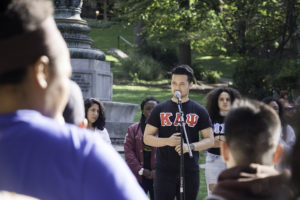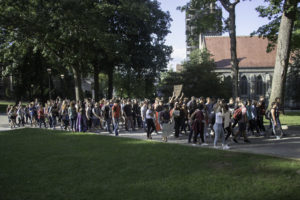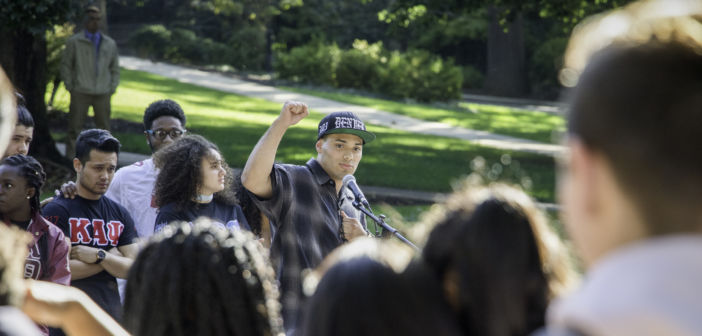President Trump called for the repeal of the Deferred Action for Childhood Arrivals on Sept. 5, signaling an end to the legal protections of approximately 800,000 people in the United States. Two days later, Lehigh’s Cultural Greek Council held a rally in support of DACA on the front lawn.
A number of students, faculty and administrators gathered to share support, hope and encouragement for undocumented students. After short speeches from members of the council and professor Marilisa Jiménez García, people in the crowd were invited to speak.
Ruben Rosas, ’20, delivered a passionate speech about growing up in a largely undocumented community and vowed to do all he could to protect those with DACA status.
“I just spoke from the heart,” Rosas told The Brown and White. “When you speak from the heart, you don’t have to rehearse, and that’s why the message resonated with so many people — because it was from the heart, there was emotion and history tied to that message.”
Rosas said he felt it was crucial for him to attend the rally, not only to support students at Lehigh but also to support his hometown community in Denver.
“Where I come from, it’s sort of dominantly Hispanic, so it was rare for me to know anybody who wasn’t under DACA,” Rosas said. “It was rare for me to know people who were documented because the majority of my community is undocumented.”
The president of the Cultural Greek Council, Djenne Dickens, ’18, said DACA is important to the council because one of their members, Julius Wibisono, is a recipient.

Julius Wibisono, ‘20, shares his story as a DACA recipient during the DACA rally on Sept. 7, 2017, on the UC Front Lawn. The rally was held after President Trump announced the repeal of DACA on Sept. 5, 2017. (Sam Henry/B&W Staff)
Wibisono, ’20, came to the U.S. when he was 8 years old. His family was visiting the country on vacation from Indonesia when they decided to permanently stay.
“Because my family and I had the intentions of just traveling, we did not need a green card (because) we did not know we would end up staying here,” Wibisono said.
DACA is specifically for people like Wibisono, who were brought to the U.S. by their undocumented parents.
The act allows individuals to receive a social security number, work authorization and the ability to get a driver’s license. DACA recipients cannot have a criminal record. They must either be enrolled in high school or college, or have a diploma or honorable discharge from the U.S. military. It does not provide lawful immigration status.
Rosas said recipients of the act benefit society and are not hurting the U.S.
“If anything, the (DACA recipients) are contributing greatly to the GDP of this country,” Rosas said.
According to a Sept. 6 email from President Simon, Lehigh does not have an exact number of those directly impacted by the repeal of DACA. However, Wibisono said Lehigh is one of the most DACA-friendly universities in Pennsylvania.
Wibisono said it has been difficult since Trump made his announcement. He said he just wants to fit in on campus, but his immigration status has kept him from getting outside his comfort zone.
“Walking around campus is hard, because people do not actually feel or even realize that I carry this constant pressure everyday when I wake up, when I go to class, not knowing what’s gonna happen tomorrow,” Wibisono said. “This is the first time in my life ever that I don’t know what’s going to happen, not just for me, but my family as well.”
Wibisono said the idea of a simple path to citizenship is “100 percent myth.” He said besides complicated paperwork and years of waiting, the legal fees associated with the process can be too expensive for many families.
“It’s money too, and for families like us, like myself, I don’t know where I’m going to get all that money all at once,” Wibisono said. “So that’s the myth, it’s not that easy.”

Lehigh students, faculty and administrators march together on Sept. 7, 2017 on the UC Front Lawn for the DACA rally. The rally was held for the Lehigh community to share their stories and support for undocumented students affected by DACA’s repeal. (Sam Henry/B&W Staff)
On Monday, the university sent a followup email to the Lehigh community about on-campus resources for DACA students. The email said recipients will have access to immigration specialists or attorneys for confidential consultations. The Office of Counseling and Psychological Services will provide one-on-one counseling services for students, and emergency loans and grants are available to students who encounter unexpected expenses.
According to the email, Lehigh will also “contact members of the Pennsylvania Congressional delegation and voice (its) support for those who are impacted by the termination of DACA.”
Still, Wibisono has unanswered questions. He said the original email from Simon felt vague and Wibisono worries about both his financial situation and immigration status.
“Right now I’m very uncomfortable with where I’m at,” Wibisono said.
Rosas thinks the university should do everything it can to keep DACA students safe, including keeping their records and documentation confidential.
He would also like to see more invovlement and support from the campus community as a whole.
“I just wish there was more support from students of color,” Rosas said. “But I felt like for the most part, a lot of people could have gotten involved, but they just chose not to or it wasn’t their first priority.”
Dickens said the student body should be supportive and accepting, and if they feel passionate about the repeal, they should take action.
Wibisono said he would have liked more participation from faculty members. He said he talked to multiple departments to find a professor to speak at the rally, but there were few professors who could actually explain DACA. Wibisono said it should be a priority for faculty and administrators to educate themselves about the act.
“Staff and faculty should keep an open mind, especially with exams coming up and assignments, because honestly it’s a huge amount of pressure and emotional toll to walk every day thinking, ‘OK the DACA program just ended, what does my future look like?'” Dickens said.
Rosas said he was disappointed to see few faculty at the rally, besides some professors of color, and would have liked to see Simon there.
Despite all the difficulties and uncertainties he is facing, Wibisono said he can’t imagine leaving the U.S.
“I didn’t even really think about going back because this is my home,” Wibisono said. “Indonesia is where I was born, but I grew up here most of my life. Just being just scared of being deported out of your own home — it’s crazy.”
Additional reporting by Chris D’Agostino.






Comment policy
Comments posted to The Brown and White website are reviewed by a moderator before being approved. Incendiary speech or harassing language, including comments targeted at individuals, may be deemed unacceptable and not published. Spam and other soliciting will also be declined.
The Brown and White also reserves the right to not publish entirely anonymous comments.
1 Comment
Pingback: Cultural Greek Council rallies in support of DACA | Hellas Zone